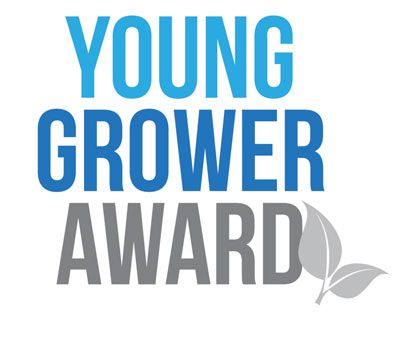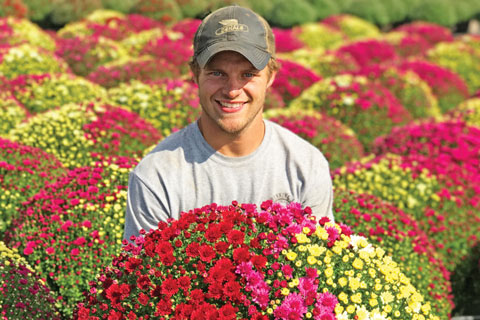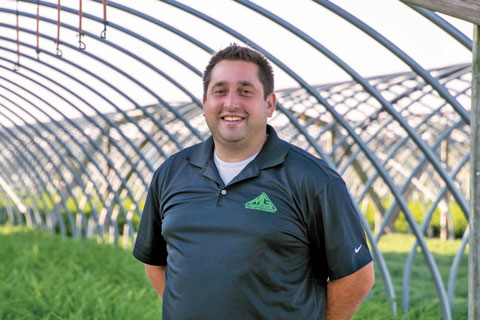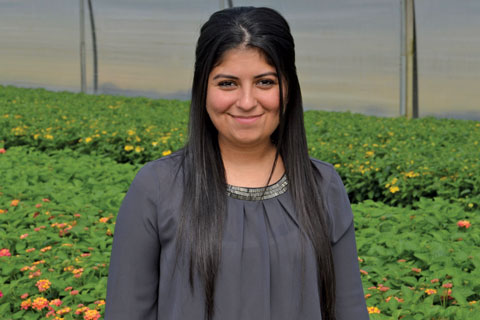6/1/2022
Building on Loyalty
Jennifer Zurko

Some industries are probably fine with not ever doing business in person again. But one of the many lessons that the pandemic taught us is that’s definitely not the case with horticulture.
We missed seeing each other at trade shows. We missed visiting growers and retailers to check out what they were up to. We missed the camaraderie and face-to-face networking that our industry is built on.
What do we always say? Our industry is built upon the relationships we’ve created and fostered throughout the years, and this will never change.
Some of the ways we maintain these relationships has changed a bit with better, more timely communication methods. But the service we provide is always the same: quality, transparency, integrity.
That seems to be the theme of the essays written by this year’s Young Grower Award finalists. In order to truly take care of their customers, the businesses that they work for preach going the extra mile with high quality and innovation, and being honest about mistakes and providing solutions to fix them. In turn, they show loyalty to their own vendors by not always looking to get products for the cheapest price.
It’s a practice that’s served businesses in our industry well for generations. And with these up-and-comers learning and applying the same lessons, it’ll continue for many more.
Our panel of judges will choose the 2022 GrowerTalks/Ball Horticultural Company Young Grower Award winner based on their nomination applications, their essays and a telephone interview. We’d like to thank our esteemed judges for their time and support of this award. This year’s judges are:
Anna Ball—CEO & Chairman of the Board, Ball Horticultural Company, West Chicago, Illinois
Art Parkerson—Owner, Lancaster Farms, Suffolk, Virginia
Amy Morris—Vice President, N.G. Heimos Greenhouses, Millstadt, Illinois
Maddie Maynor—2021 Young Grower Award Winner, BioWorks, Victor, New York
Q. Long-term business relationships and loyalty drive our industry and have for generations. What are some specific strategies your business has implemented to create and foster strong relationships with your suppliers and customers?
Quinten Henning
Age: 23
Title: Vice President
Operation: Henning’s Farm & Greenhouses—DeMotte, Indiana
The horticulture industry consists mostly of family owned and operated businesses. Many of these businesses have been passed down through generations. This can lead to developing some incredibly strong business relationships with roots that can grow significantly deep.
If one were to ask any grower in this country, there would be a significant number who would agree that loyalty to their customers and suppliers plays a substantial role in much of the decision-making process. Although there are many other factors that go into this process, to successfully plan for the future of any operation, building and maintaining those relationships should be a top priority.
As a fourth-generation grower and the second generation at Henning’s Farm & Greenhouses, I’ve witnessed this firsthand. My parents started this business in 1987, and to this day, we’re still working with multiple clients and suppliers who began doing business with my mom and dad over 30 years ago. That’s an incredible accomplishment in most industries, however, in the horticulture industry, it’s not unusual at all. This may lead one to ask what exactly helps to establish these relationships and what’s the best way to maintain them?
 For us, it’s simple: integrity. This is the single most important part of creating and fostering any business relationship. Integrity should be the first word that comes to mind when people think of a business and its owners. When a grower makes an agreement with a client or supplier and shakes their hand, the grower must follow through with his or her part of the agreement. In order to operate any business that an owner can be proud of and pass on to the next generation, the owner must put an enormous emphasis on his or her code of ethics and consistently stay true to that code. If a grower can run a business in this manner, customers and suppliers will certainly notice.
For us, it’s simple: integrity. This is the single most important part of creating and fostering any business relationship. Integrity should be the first word that comes to mind when people think of a business and its owners. When a grower makes an agreement with a client or supplier and shakes their hand, the grower must follow through with his or her part of the agreement. In order to operate any business that an owner can be proud of and pass on to the next generation, the owner must put an enormous emphasis on his or her code of ethics and consistently stay true to that code. If a grower can run a business in this manner, customers and suppliers will certainly notice.
In our industry, there’s a remarkable amount of risk that can come from any angle. As buyers and suppliers, being able to trust the person on the other end of the deal is extremely comforting and is a great way to lighten the stress of an already tremendously stressful job. I’ve had many of our clients tell me that a substantial amount of value is added to our products because they don’t have to worry about us coming through on our end.
Having been raised in a family business, I was given an enormous amount of responsibility from a very young age. At times it felt as if I were learning how to be a grower and run a business by being pushed into the deep end and seeing if I could figure out how to swim. With that being said, I’ve made my fair share of mistakes, some of them costly. I still make mistakes almost daily. In my experience, I’ve found that when I make a mistake, no matter the size, it can still be a great opportunity not only to learn, but also to build an even stronger relationship with the person affected by that mistake.
Admit when a mistake or error has happened and be transparent about it. Let the other party know what happened, how it happened, and most importantly, the available options to correct it. Once a solution is agreed upon, promptly follow through with it, no matter the cost. It’s easy to try and hide the mistake to save money or to avoid fixing it, but eventually, customers will become aware and be hesitant to make future purchases. A grower may be able to make a little more money one year by ignoring those errors; however, far more money will be lost in the long run when those orders start to dwindle.
Oftentimes, we’re unfortunately defined and remembered by our few weaknesses over our many strengths. Rather than letting a mistake be noticed as a weakness, let it be known that being able to adapt and overcome is one of your greatest strengths.
Another significant component of building and keeping these business relationships is the staff. A grower often manages a large number of employees, and these people can make or break any operation. To be an efficient leader, it’s important to value those people more than any single supplier or client. Without these staff members, there would be no growing, and therefore, no suppliers or clients. Unfortunately, I’ve seen managers yell and belittle people when they do something wrong, which will only make things worse.
Nobody deserves to be treated poorly in a work environment. Instead, it’s more effective to show them the problem, explain why it’s a problem and teach them how to fix it. I’ve always made it a point to never raise my voice at someone working under me. I believe treating every single person with respect makes a huge difference in employee satisfaction. This strategy raises morale and creates a great working environment, which is key to providing high-quality products and ultimately keeps customers coming back. Clients and suppliers can easily sense the morale of the staff and that can have a great impact on how they view that operation.
There are numerous additional strategies that we actively implement to improve our relationships with our business partners and customers. However, I do believe that putting good old-fashioned honesty and hard work first is by far the most effective way to do that. Being able to own up to mistakes and fix them in a timely way is a close second.
In a fast-paced world full of cutting corners, it’s refreshing to work with people that can do business on a simple handshake. For me, it’s about slowing down and sticking to my roots. I try to carry with me every day something I was taught very early in life: By simply treating others as you would like to be treated, wonderful and amazing things will soon follow.
Q. Long-term business relationships and loyalty drive our industry and have for generations. What are some specific strategies your business has implemented to create and foster strong relationships with your suppliers and customers?
Mike Krueger
Age: 31
Title: Nursery Manager
Operation: Midwest Groundcovers—St. Charles, Illinois
Peter Orum started Midwest Groundcovers in 1969 as a wholesale nursery to supply groundcovers to local landscapers, independent garden centers and nurseries in the Chicagoland area. In the early days, a customer came in and said he would buy 10 flats of pachysandra, but only if Peter could deliver the plants the next day. Though Midwest Groundcovers at the time had no intentions of delivering plants, nor owning a shipping fleet, Peter made a decision that would send the company down a whole new trajectory.
He loaded up his car and the plants were in the customer’s hands all within 24 hours. Fifty-three years later, some things have changed, but loyalty, fairness and servicing the customer’s needs have been the pillars that Midwest Groundcovers is built on.
 The same holds true for our suppliers, as we need them just as much as they need us. Strong partnerships are so integral to how we operate, not only internally, but also with our customers and suppliers, that “relationships” is the first thing listed under our Value Statements on the company’s website. The emphasis placed on the human element of relationships is what keeps driving us forward. Today, Peter’s daughter, Christa, is the owner and president of the company, but she still shares the same sentiment that strong relationships are the backbone of Midwest Groundcovers and how we conduct business.
The same holds true for our suppliers, as we need them just as much as they need us. Strong partnerships are so integral to how we operate, not only internally, but also with our customers and suppliers, that “relationships” is the first thing listed under our Value Statements on the company’s website. The emphasis placed on the human element of relationships is what keeps driving us forward. Today, Peter’s daughter, Christa, is the owner and president of the company, but she still shares the same sentiment that strong relationships are the backbone of Midwest Groundcovers and how we conduct business.
Ensuring that Midwest Groundcovers continues to serve its customers as Peter did from the very beginning is still front and foremost today. Every few years, Midwest Groundcovers creates a strategic plan for the upcoming years, and every plan encompasses how to improve our service for the customer. This is in all aspects of the company, from sales and shipping down to production.
To create the basis of our current strategic plan, we used the Value Discipline Model as a starting point. This model consists of Service and Product Leadership, Customer Intimacy and Operational Excellence. The point of the model is that a company cannot equally exceed in all three of these values. Where we’ve worked hard to home in on is Service and Product Leadership. We strive to carry a wide variety of plants and to be the one-stop-shop for our customers.
In the modern era of online shopping, we’ve put resources into enhancing our website and added an online ordering option. This allows customers to place orders for plants whenever they can find time in their busy schedule. Turnaround times for orders is 36 hours, and customers have the choice between picking up in our yard or having one of our many fleet vehicles deliver to their location or jobsite.
We’ve created display gardens so that customers can come and get inspiration for their projects and clients. Another way we try to serve our customers is by partnering up with industry professionals or use our own staff to hold educational seminars on topics ranging from new varieties of plants in the market to improving the efficiencies of their own operations. Midwest Groundcovers also participates and sponsors many industry organizations and events as a way to give back to the green industry.
On the production side, we’ve been working to make our crop quality standards visible to our customers for better transparency, allowing us to meet their expectations. At the same time, when mistakes happen, we listen diligently to our customers and do our very best to make it right for them. Our internal SharePoint page helps track these issues, and makes sure that the sales and production teams are in sync to ensure the same error isn’t repeated. This is how Midwest Groundcovers continues to foster relationships with our customers and build a lasting trust.
Sustaining relationships with our suppliers is as equally important as with our customers. What I’ve learned at Midwest Groundcovers is, just like our customers, you give suppliers the same respect. One of our closest suppliers is our sister company, Midwest Trading, which supplies our soil mixes. We’re fortunate to have them and through this relationship it’s helped us at Midwest Groundcovers see how difficult of a task our suppliers have at sourcing the raw materials they need to create the products that we buy.
Suppliers are not only those that supply us with direct materials like containers, soil and liners, but also the contractors that assist with repairs, construction and general maintenance. We value the personal relationships we’ve created with our suppliers and have stuck with many of them for decades. The groundwork of that is being flexible and working with our suppliers to find a common ground. Setting realistic expectations is another part of a lasting relationship. A good supplier will already be looking out for you in all aspects from quality of product to price in order to meet your needs. We work to be understanding that suppliers have the same problems we face. Because of that, we don’t jump from supplier to supplier, looking for the lowest cost because quality service comes with a price as well.
This brings up the final part of the puzzle: communication. Welcoming suppliers to come for visits when they’re on the road or making time for a phone call allows them to understand our unique needs. Making the most of our supplier’s time is just as important as making the most of our customer’s time when we interact.
To break it down quite simply, whether we’re speaking about our customers or suppliers, the answer to a long and prosperous relationship at Midwest Groundcovers is the human element of doing right by the customer or supplier. The value of relationships started with Peter and is now carried on by Christa. It’s in our company Value Statements and it’s the foundation of strategic plans for the future. Building and sustaining relationships is culturally a part of how Midwest Groundcovers operates as a business, both inside and out.
Q. Long-term business relationships and loyalty drive our industry and have for generations. What are some specific strategies your business has implemented to create and foster strong relationships with your suppliers and customers?
Erika Ramos
Age: 30
Title: Propagation Manager
Operation: J. Berry Nursery—Grand Saline, Texas
When J. Berry Nursery (JBN) was first started, we were a small company competing against a multitude of other, more-established businesses. We needed to distinguish ourselves, do something different, something that would set us apart and give us the advantage. As a result, JBN has made it part of its culture to implement core values that bring about strong relationships, not only with our employees, but also with our suppliers and customers. Leadership, innovation, integrity and resilience are part of our culture, and play a key part in our internal and external relationships.
Internally, our employees are encouraged to express initiative through new ideas and techniques. Leaders are constantly being sought out, trained and developed, which creates more stability and opportunity for our employees. JBN takes pride in our ability to shape leaders and bring about not just a great work environment, but also a cascading desire throughout our workforce to take ownership of our collective ability to produce great plants.
 JBN’s continuous innovation and selective breeding is one of the things that drives our business, with our customers’ success in mind as our end goal. We look at all aspects of our business to innovate, from new processes and equipment to new breeding and genetics. We’re constantly pushing our employees to be the best version of themselves and helping them achieve their work potential by continuously refining and improving our methods and facilities. We’re always open to new ideas to become more efficient, allowing us to do it better, faster and cheaper.
JBN’s continuous innovation and selective breeding is one of the things that drives our business, with our customers’ success in mind as our end goal. We look at all aspects of our business to innovate, from new processes and equipment to new breeding and genetics. We’re constantly pushing our employees to be the best version of themselves and helping them achieve their work potential by continuously refining and improving our methods and facilities. We’re always open to new ideas to become more efficient, allowing us to do it better, faster and cheaper.
JBN strives to produce the highest quality plants and lead the market with our genetics. We look for the best genetics on the market, and our research and development department works tediously to figure out what will work best for us and our customers. Initiative, innovation and drive have led to many breakthroughs, and focusing on improving strategies through science and legitimate crop improvement has brought great genetics to our plants.
Our customers view us as a niche, specialty supplier that offers the most innovative branded products. Continuous breeding efforts have brought about some of our most famous brands, like Hollywood Hibiscus and Black Diamond Crape Myrtles. Both continue to replace old genetics by achieving high performing, pest and disease resistance through resilient breeding and selection. Having high-quality and reliable brands has made a significant mark with our customers, especially as their name recognition grows and consumers start asking for them by name. Our quality is something our customers can depend on.
Our owner and president, Jim Berry, is a well-known industry leader. Having the connections and relationships that he’s made throughout his career allows us to collaborate with other breeders, nurseries and universities to bring forth great genetics to our customers. Having these connections has been a great advantage to our company, as helpful tips, tricks and knowledge are readily shared with one another. The result of this collaboration includes the introduction of new varieties, learning how to improve on our techniques and staying on top of new market trends.
By applying the techniques that we’ve learned from these relationships and previous scientific research, we’re able to continue innovating on numerous fronts. Our new genetics now require less chemicals, as we’re shifting our focus to using more biologicals, as well as higher-performing plants that provide longevity and durability for our customers. Not only are we improving our genetics, but we’re doing our best to stay abreast to keep up with environmentally friendly practices. We want to set the example and be better stewards of our global impact.
Our integrity as a business is something we’ve sought out and relied on since the start, and something we try to uphold both internally and externally. Being dependable is of great importance to us and what we say is what we believe. Our business relationships have been built on years of hard work and trust. Long-term business relationships have been driving our industry for years and trust doesn’t just happen overnight; it’s something we’ve built on and created with our customers and suppliers over time. Listening to their needs and wants is of the utmost importance and being able to compromise when needed is what has kept our relationships strong.
By keeping their best interests in mind, we’ve been able to keep a close relationship even in challenging times; it’s important to us to keep on delivering quality. Not only do we check all the boxes, but we continue to show that we have the knowledge, intuition and initiative to develop the next big thing that will continue to distinguish us from the rest and make our customers more successful.
At the end of the day, everything we’ve accomplished has been due to our amazing team and our resilience as a company. We’ve worked hard to prepare in advance for the hazards of the future and we’ll continue to pull through not only for ourselves, but also for our customers. They can depend on us when we make commitments to them for the one-, five- and 10-year plans.
Honest relationships are invaluable in any industry, and by having that shared integrity and reliability, the company will continue to thrive. We foresee great opportunities in the future and are confident that J. Berry Nursery is in good hands with the next generation. GT
 Find out who the winner is for our 18th Annual GrowerTalks/Ball Horticultural Company Young Grower Award at the Unplugged event during Cultivate’22 in Columbus, Ohio, being held at Gaswerks from 8:00 to 10:00 p.m. on Monday, July 18.
Find out who the winner is for our 18th Annual GrowerTalks/Ball Horticultural Company Young Grower Award at the Unplugged event during Cultivate’22 in Columbus, Ohio, being held at Gaswerks from 8:00 to 10:00 p.m. on Monday, July 18.